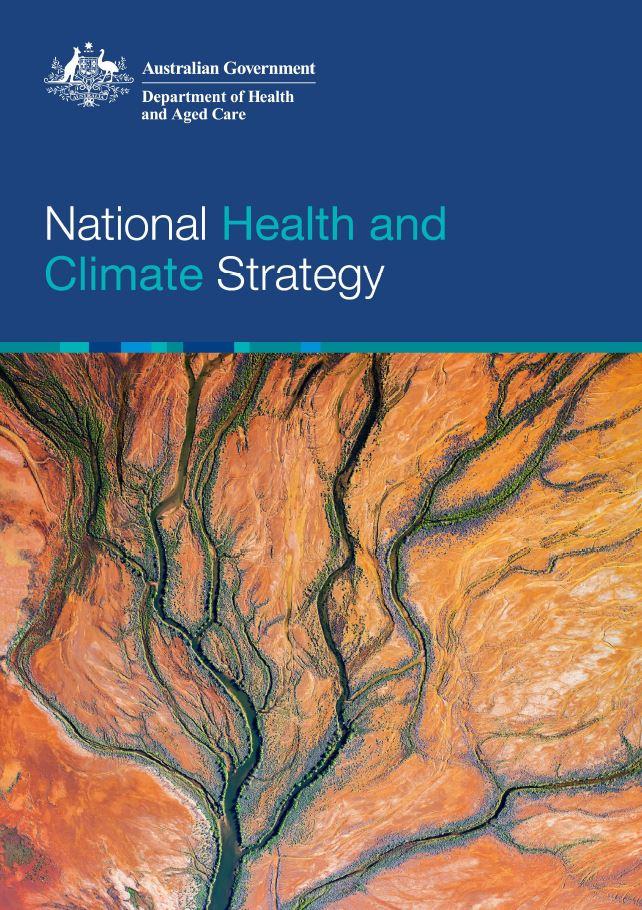The National Health and Climate Strategy aims to build a sustainable, climate-resilient, high quality, net zero health system for Australia.
Australia’s first National Health and Climate Strategy was launched in December 2023 at the 28th Conference of the Parties (COP28) by the Honourable Ged Kearney MP, Assistant Minister for Health and Aged Care, where she noted that the launch “highlights a beginning, and ahead of us lies the journey of delivering its ambitious program of work.”
One year on from the launch, a perspective published in the Medical Journal of Australia reviews the development of the Strategy, discusses the challenges of implementing the Strategy, and highlights how health care professionals can contribute.
Among the authors of the perspective is Dr Madeleine Skellern, Director of the National Health, Sustainability and Climate Unit, who led the development of the National Health and Climate Strategy.
“In this perspective article, we review the Strategy’s origins, development, and key features; discuss the challenges that must be tackled in the coming years; and highlight the leadership role that health professionals can play in the response to climate change,” Dr Skellern and colleagues wrote.

Key themes of the Strategy
During consultation and development of the Strategy throughout 2023, some key themes emerged, including:
- that good climate policy measures should protect the health of both people and planet;
- the need for a Health in All Policies approach;
- the importance of applying a health equity lens to address health disparities;
- the importance of promoting good health and disease prevention in reducing health system demand and reducing climate impacts on health;
- the need for action at all levels of government; and
- the vital role played by frontline health professionals in driving innovation to improve the quality, resilience and sustainability of Australian health care.
Stakeholders in developing the Strategy also emphasised that holistic partnerships with First Nations communities will be vital in improving human and planetary health.
“First Nations peoples’ deep and nuanced knowledge — developed over tens of thousands of years of close observation and sustained custodianship of Country — is not only crucial in addressing the impacts of climate change on First Nations peoples’ health, but also can improve health and build climate resilience for all people in Australia,” the perspective authors wrote.
Changes already underway
The National Health, Sustainability and Climate Unit has commenced work on 31 of the 49 actions within the Strategy, with 12 already complete and planning underway on a further 14 actions.
Actions include publishing baseline health system emissions estimates, with the aim to develop a low emissions model of care and a net zero implementation guide.
Work is also underway to reduce emissions from asthma inhalers and anaesthetic gases.
Beyond the immediate health system, other cross-government initiatives are taking place, such as considering the health benefits of climate-resilient housing in developing the National Housing and Homelessness Plan, and taking sustainability into account in the updated Australian Dietary Guidelines.
“Many of the negative impacts of climate change on health will occur via impacts on the wider determinants of health, so it is critical that policies to ameliorate health impacts encompass these upstream drivers,” the authors wrote.
Leadership from health professionals
The perspective authors note that leadership from health professionals will be crucial in realising the ambitions of the Strategy.
“A net zero, climate-resilient health system must have as its bedrock a motivated, innovative, and upskilled workforce, that can translate the Strategy’s vision and objectives into reality on the ground,” the authors wrote.
Clinician-led initiatives are already achieving great outcomes, such as a team in the Royal Melbourne Hospital emergency department who were able to reduce unnecessary arterial blood gas and coagulation profile testing and achieve an annual emissions reduction of 900 kg carbon dioxide equivalent.
“We have been impressed and inspired by clinicians’ incredible passion for addressing climate change, and will work to support their longstanding, vital leadership towards a net zero, climate-resilient health system in the years ahead,” the perspective authors wrote.
The Australian Government will lead the implementation of the Strategy over the next five years.
“This work is a shared responsibility of every health professional and every part of the health system. We look forward to working collaboratively with stakeholders, including frontline health practitioners, to realise this vision in the years ahead,” the authors concluded.
Read the perspective in the Medical Journal of Australia.
Subscribe to the free InSight+ weekly newsletter here. It is available to all readers, not just registered medical practitioners.

 more_vert
more_vert